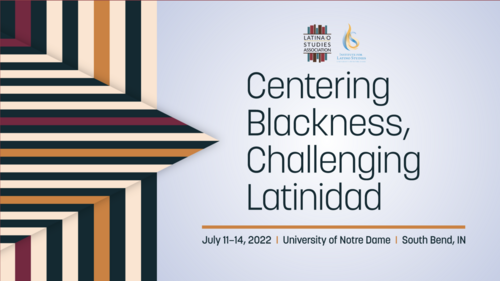
The University of Notre Dame’s Institute for Latino Studies will host the biennial Latina/o Studies Association Conference on campus this Monday through Thursday (July 11-14).
The Latina/o Studies Association, a nonprofit organization founded in 2014, seeks to promote the research and teaching of Latino studies, advocate on behalf of Latinos and encourage policy change.
The 2022 conference, “Centering Blackness, Challenging Latinidad,” will draw more than 400 academics, students, artists, writers, filmmakers and community members to the Notre Dame campus. The conference seeks to promote a generative dialogue about the erasure of people of African descent from Latinidad — generally, Latino communities — and to better understand and address systemic forms of racism against Black Latino communities.
This year’s theme was selected by the LSA Site Committee, chaired by Marisel Moreno, the Rev. John A. O’Brien Associate Professor of Latina/o Literature, and Paloma Garcia-Lopez, associate director of the University’s Institute for Latino Studies.
Originally scheduled for summer 2020, the conference was postponed due to the COVID-19 pandemic. Once planning for the 2022 conference began, the Site Committee selected a new theme in order to address what members saw as a moment of racial justice reckoning in the U.S. following the death of George Floyd.
“We felt compelled to revisit the main topic of the conference as a response to current events and the issues of racism and anti-Blackness we are facing as a nation — and globally,” Moreno said. “This is a unique opportunity to host our scholarly and community gathering around a very urgent topic that can help us make a difference in terms of how the field is shaped moving forward.
“It’s also a concrete way for our University to participate in crucial dialogues around issues of racism and anti-Blackness. One of my greatest hopes is that this gathering, and the ideas that we share, are inspiring especially to younger faculty and graduate students and that our conversations help to shape their own research and to ignite in them an interest in exploring topics that have been silenced or understudied up to now.”
The conference will feature a number of acclaimed Afro-Latino speakers, including novelist and intellectual Mayra Santos-Febres, one of Puerto Rico’s most celebrated authors; scholar Lorgia García Peña, the Mellon Associate Professor in the Department of Studies in Race, Colonialism and Diaspora at Tufts University; and artists Juana Valdes and Arturo Lindsay. Additional presenters include author Xavier Navarro Aquino, an assistant professor in Notre Dame’s Department of English, as well as poet Julian Randall and film director Michèle Stephenson.
Sarah Mustillo, the I.A. O’Shaughnessy Dean of Notre Dame’s College of Arts and Letters, will offer welcoming remarks on Tuesday (July 12), and Luis Fraga, director of the Institute for Latino Studies, will speak at the conference’s opening reception Monday evening (July 11).
In addition to a series of plenary sessions and roundtable discussions, the conference will include the “LSA Plaza” — a dynamic space where participants can gather to engage with local Latino artists, attend book or poetry readings, talk with publishers, interact with community groups and continue conversations.
The goal of the conference is to create a space where AfroLatinidad is celebrated and to foster honest dialogue about how anti-Blackness impacts the Latino community. For too long, Moreno said, Black Latinos have been marginalized in academia and in wider society.
“The Latino community is not a monolith — and there’s a misconception that it is, even among Latinos themselves,” she said. “That’s part of the issue. But there’s also the question of what role anti-Blackness plays in Latinx communities — and how Latinos and Latinas are complicit in anti-Blackness, since whiteness continues to be privileged in Latinx communities.
“We are looking forward to bringing more visibility to this issue, since it is a key topic on which Latina/o studies as a field needs to engage with more honestly and intentionally. This conference is a great opportunity to center the history and the cultural production of Black Latinos that has long been overlooked.”